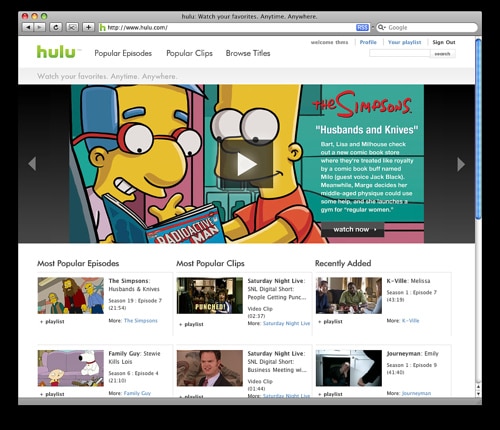
Telegraph.co.uk’s sources have been promising the paper Hulu’s imminent UK launch for so long now that, now it’s reporting “further delays” to the U.S. VOD site’s ambitions here, we’re barely inclined to mention it – but anyway…
Despite claiming in August that Hulu was in “most advanced discussions” to land ITV (LSE: ITV) content, it now says those negotiations have “come to a halt” – something that seemed clear, since so much time has elapsed that ITV first took an interest in Hulu’s offer of equity in exchange for content…
Telegraph.co.uk in part blames ITV’s cold feet on a strategic review started by its new chairman – but, anyway, we think ITV would have been crazy to give Hulu the exclusive license it apparently wanted, with so much uncertainty surrounding the growing crop of competing UK VOD services.
Hulu has already lost any chance of exclusivity on Channel 4 and Five shows – they have signed to distribute through YouTube and SeeSaw, which launches on Wednesday. Both sites have allowed the broadcasters to sell their own ad inventory around their shows.
Forget exclusivity; Hulu needs to accept non-exclusivity and offer inventory control if it’s too stand any chance of being a UK player. Rather than court equity in a service that’s unlikely to generate a sale return, ITV, for its part, should welcome these other platforms and demand the same power to sell its own ads, embracing what could be massive redistribution of its shows and adverts until Project Canvas’ launch brings a similar catch-up service to living-room IPTV next year.
SeeSaw, the Arqiva-operated video site that runs on technology bought from prohibited BBCWW/ITV/C4 JV Kangaroo, is Hulu’s biggest competitor in the newcomer-VOD-aggregator stakes – and opens to the public on Wednesday with three licenses against Hulu’s none.
But that doesn’t mean SeeSaw stands a significantly better chance of becoming viewers’ web VOD gateway of choice. With only C4 and Five catch-up and some archive BBCWW shows, it’s so far lacking the catalogue depth that will be required if it’s to capitalise on its excellent brand. It’s choosing to come to market anyway in what is likely a hope that real, working audience will put it farther ahead.
Lurking with much larger audiences and existing brand traction are YouTube, MSN and the BBC, which still wants to share its iPlayer with broadcasters.